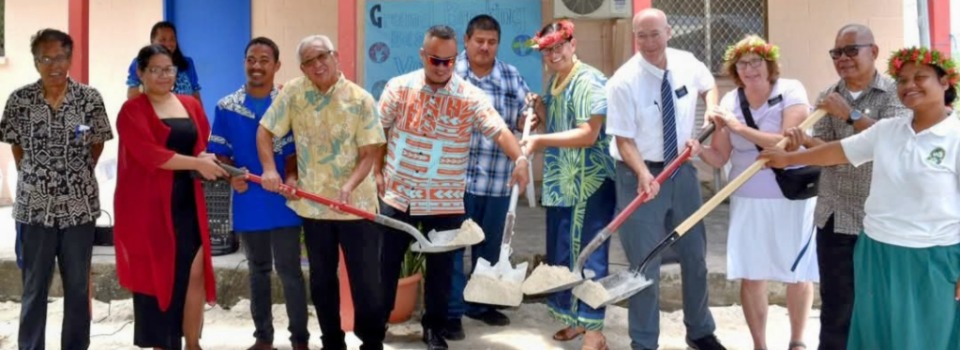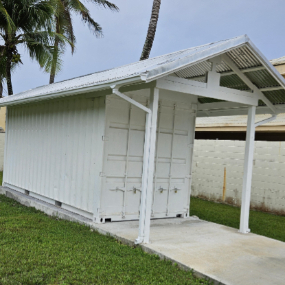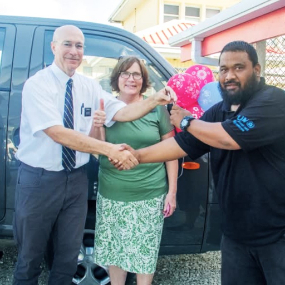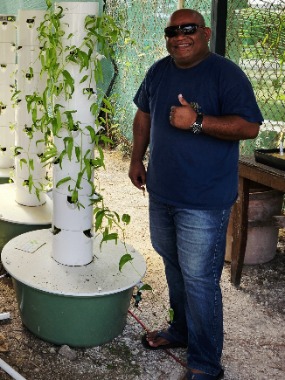About halfway between Hawaii and Australia is a nation whose national anthem describes their island home as, “A wreath of flowers upon the sea.”
That’s the Marshall Islands, and it’s a home that many Marshallese work together to protect from serious environmental threats while addressing humanitarian needs made more complicated by such a vast and remote location.

Majuro-1.jpg
Groundbreaking for the Majuro Deaf Education Center multi-use athletic court which will provide a safe and structured environment for children with disabilities. July 2025.© 2025 by Intellectual Reserve, Inc. All rights reserved.The country’s 29 coral atolls and five main islands are spread over nearly two million square kilometres and have an average elevation of just over two metres above sea level. Cyclones, rising sea levels, and reliable freshwater and food sources challenge all efforts to bring relief to the most basic human needs.
It’s a place where The Church of Jesus Christ of Latter-day Saints and its approximately 6,600 members are stepping in to make a difference.

“What sets the Church apart is their genuine commitment to listening—truly listening—to our local voices and responding to our real, expressed needs without imposing outside agendas,” said Dr. Natalie Nimmer, Commissioner of Education for the Marshall Islands.
“The support reflects deep respect for our communities and our priorities. This is partnership at its best – rooted in mutual respect, cultural sensitivity, and shared hope for a brighter future for every Marshallese child.”
That support from the Church has taken the form of providing biodegradable menstrual products for all girls in grade six and above, supplying vital sports equipment for physical education classes across the country, building a recreation court and safety fence at the Majuro Deaf Education Center, and collaborating with the Marshall Islands Red Cross to purchase a vehicle to deliver relief supplies.

Another project made possible with humanitarian funds from the Church is a new shipping container used to store emergency supplies in Majuro, the capital of the Marshall Islands.
While the container needed replacement, an assessment determined a concrete pad and ramp to the doors as well as a covered porch to protect the doors was also in order. In restocking the container, water damaged items and expired items were replaced. The final product was one with greater longevity and functionality.
“Small projects or large, when we have called upon the volunteers of your church or your missionaries, they show up every time,” said Regional Co-Director of Canvasback Wellness Center, Rick Wiegel.

Canvasback Wellness Centre has supported several humanitarian programs in the Marshall Islands over the last 18 years.
Wiegel continued: “So many times, non-government organisations venture into these areas and build something then leave, only to discover a year or two later, the project was abandoned. The Church has given us a travel and accommodation budget to travel to the outer island atolls to ensure the longevity of our projects.”
Those projects include aeroponic tower gardens and the solar power systems that keep the automated irrigation system running. These gardens require no soil, use 98% less water than traditional gardens, and the vegetables they produce ensure food security in a place where fresh produce is very expensive and scarce.
“Not only have we completed and are able to maintain these projects with the help of The Church of Jesus Christ of Latter-day Saints,” Wiegel says, “we’ve also made many great friends along the way.”
Two of those friends are Elder Mark and Sister Diane Nelson, from the USA. They’re humanitarian missionaries with the Church of Jesus Christ serving in the Marshall Islands for 18 months. They work with Church and community leaders to identify needs and then bring projects to completion.
“We love the Marshallese people! They’re amazingly happy and work very hard to look out for everyone. If we can help that along, that’s what we’re here to do,” said Sister Nelson.